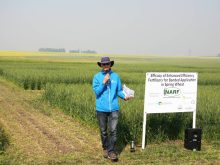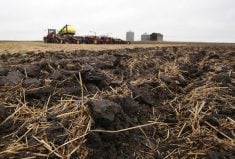Canadian canola growers get the sense the federal biodiesel mandate will be delayed.
The proposed two percent mandate is scheduled to be implemented on July 1, after publication deadlines for this issue.
Rick White, general manager of the Canadian Canola Growers Association, said there could be some “slippage” on the start date.
A spokesperson for Environment Canada said a decision on the coming- into-force date would be coming soon.
Regardless of when it starts, representatives of the canola and biodiesel sectors applauded the government for moving forward with a mandate that will create a new annual market for an estimated one million tonnes of North American canola.
Read Also

Russian wheat exports start to pick up the pace
Russia has had a slow start for its 2025-26 wheat export program, but the pace is starting to pick up and that is a bearish factor for prices.
But they are upset that a biofuel incentive program failed to deliver any sizable canola biodiesel plants on the Prairies.
“The Ecoenergy (for Biofuels) program did not come through for Western Canada in that regard,” said White.
There is an estimated 20 to 30 million litres of existing canola biodiesel production to fill a mandate that will require about 300 to 350 million litres of biodiesel in Western Canada annually.
The canola industry had hoped there would be two large-scale canola biodiesel plants operating by now to fill that mandated demand.
“Despite everybody’s best efforts we didn’t get those facilities,” said White.
Jim Everson, vice-president of corporate affairs with the Canola Council of Canada, agreed that the Ecoenergy program failed to deliver.
“We are disappointed that through the process of allocations of monies in that program there hasn’t been a large-scale biodiesel facility supported.”
He thinks there may be some funding left in the EcoEnergy program that could be reallocated to a similar type of program the government could create to fund one or two large-s cale western Canadian canola biodiesel projects.
Joe Holash, chief executive officer of Milligan Bio-Tech Inc., one of few operating canola biodiesel plants, has a different take on why no large-scale facilities were constructed.
He believes investors are gun shy because the biofuel industry has been overhyped. Plenty of grandiose proposals obtained government money, leaving investors with the false impression that they actually got built.
“Maybe that causes some concern in the investment community that it’s overbuilt and in fact it has turned out being quite under-built,” said Holash.
Another explanation for the dearth of construction activity is the rising cost of canola seed.
“Prices are high right now and for a lot of folks who have a model where they use food grade material it’s very challenging to show good economics and get that capital,” said Holash.
That’s where Milligan has a competitive advantage over other biodiesel projects. The company employs a unique process that makes use of off-spec canola.
Milligan produces three to five million litres of biodiesel annually and has plans to expand output to 20 million litres, which would meet about half of Saskatchewan’s two percent mandate scheduled to come into effect on July 1, 2012.
“We have a model that works and we have to exploit that and do bigger and better things,” said Holash.
Despite the contributions of company’s like Milligan, the vast majority of Ottawa’s mandated biodiesel demand will be filled by imported canola biodiesel produced in the United States.
“That’s unfortunate because we had a perfect opportunity to have the industry built and supplying Canada here in Canada,” said White.















